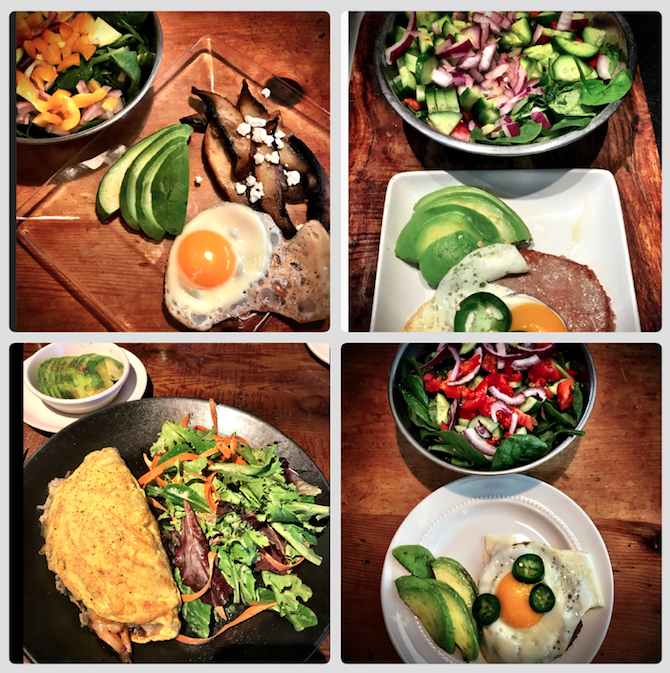It’s Dec. 26, 2017 the day after Christmas and there are 2 things I feel I must do to get my day off to a good start, or at least a fighting chance.
1. Make my bed!
“If you make your bed every morning, you will have accomplished the first task of the day,” he said. “It will give you a small sense of pride, and it will encourage you to do another task, and another, and another. And by the end of the day that one task completed will have turned into many tasks completed. According to Naval Adm. William H. McRaven, B.J. ’77, ninth commander of U.S. Special Operations Command, Texas Exes Life Member, and Distinguished Alumnus.
2. Eating salad with breakfast!
Eating salad almost every day may be one of the most healthy eating habits you can adopt — and one of the simplest, experts say.
And I try to give myself an advantage by starting the day with Spinach, Cucumbers, Red Onions and Bell Pepper… (these are just my choices)
By making one simple change to your diet – adding a salad almost every day – can pay off with plenty of health benefits.
And here are 4 Healthy Reasons to Eat a Salad Today
1. Eat Salads for the Fiber
It’s hard to believe that something we can’t even digest can be so good for us! Eating a high-fiber diet can help lower cholesterol levels and prevent constipation.
Not only that, says Barbara Rolls, PhD, author of The Volumetrics Eating Plan, eating more fiber can help you feel fuller, eat less, and ultimately lose weight.
2. Eat Salads for the Health Benefits of Fruits and Vegetables
Many experts agree that Americans need to eat more fruits and vegetables (especially dark green and orange vegetables) and legumes — all popular salad ingredients. David Jacobs, PhD, professor of Public Health at the University of Minnesota, says in an email interview that there is plenty of evidence that nutrient-rich plant foods contribute to overall health.
If you frequently eat green salads, you’ll likely have higher blood levels of a host of powerful antioxidants (vitamin C and E, folic acid, lycopene, and alpha- and beta-carotene,) especially if your salad includes some raw vegetables. Antioxidants are substances that help protect the body from damage caused by harmful molecules called free radicals.
For years, researchers have noted a link between eating lots of fruits and vegetables and lower risks of many diseases, particularly cancer. A recent study from the National Cancer Institute suggests that people whose diets are rich in fruits and vegetables may have a lower risk of developing cancers of the head and neck — even those who smoke and drink heavily. Foods found to be particularly protective include beans and peas, string beans, peppers, tomatoes, carrots, apples, nectarines, peaches, plums, pears, and strawberries.
3. Eat Salads to Cut Calories and Increase Satisfaction
If losing weight is your goal, you may want to start your meals with a green salad. Studies have shown that eating a low-calorie first course, like a green salad of 150 calories or less, enhances satiety (feelings of fullness) and reduces the total number of calories eaten during the meal.
Rolls, lead researcher of the study, suggests that “bigger is better” as long as the salad is bigger in volume, not in calories – which means more veggies and less dressing and other fatty add-ons.
“We saw reductions in consumed calories when people ate salads that were 1 1/2 cups and 3 cups in volume but around 100 total calories,” she says. The 3-cup, 100-calorie salad reduced the total calories consumed at the meal by about 55.
4. Eat Salads to Get Smart Fats
Eating a little good fat (like the monounsaturated fat found in olive oil, avocado and nuts) with your vegetables appears to help your body absorb protective phytochemicals, like lycopene from tomatoes and lutein from dark green vegetables.
A recent study from Ohio State University measured how well phytochemicals were absorbed by the body after people ate a salad of lettuce, carrot, and spinach, with or without 2 1/2 tablespoons of avocado. The avocado-eaters absorbed eight times more alpha-carotene and more than 13 times more beta-carotene (both of which are thought to help protect against cancer and heart disease) than the group eating salads without avocado.
If you dress your salad with a little olive oil, there may even be some additional years in it for you. Italian research on people aged 60 and older has suggested that a diet that includes plenty of olive oil and raw vegetables is linked to reduced mortality.


